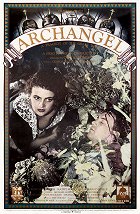Realização:
Guy MaddinArgumento:
Guy MaddinCâmara:
Guy MaddinElenco:
Ari Cohen, Kathy Marykuca, Kyle McCulloch, Michael Gottli, David Falkenburg, Michael O'Sullivan, Kurt MoritzConteúdos(1)
In 1919, one-legged Canadian soldier Lt. John Boles arrives in the northern Russian town of Archangel where Bolsheviks, White Russians and German Huns converge during World War I. When Boles encounters a local woman Veronkha, he faints and becomes convinced that she is his dead wife Iris. But Veronkha is already married to Philbin who also suffers from amnesia and relives their wedding night over and over without remembering any moment after. What follows is a twisted love-triangle infused with infatuation as each person forgets who it is that they truly love. (Zeitgeist Films)
(mais)Críticas (2)
When postmodernism suddenly awakens from amnesia and realizes that surrealism has been forgotten. The film is situated on many interpretive edges - from farce to imaginative questioning about the nature of human memory, and from a game with genres to multi-layered references to the history of cinema. It should not be forgotten that it is a quite interesting criticism of war: the film deliberately adopts the expressions of the wartime propaganda of that time for its overall framework of space and events, which occasionally creates delightful contrasts - anti-German slogans fighting against Teutonic barbarians framing the time and space of the film and standing against the personal search for emotion, the death of loved ones, etc. However, it is primarily a surrealist anabasis to the end of the world, wrapped in the retro black and white garb of silent films of the time, more so those German films rather than war or Soviet films (where the most famous product of Soviet cinema of the 1920s in the form of the montage school automatically comes to mind). However, Maddin adds some more historical inspiration to the postmodern urn - the noir genre. After all, the lonely hero with amnesia, in a hostile environment of a mysterious city, tracking his femme fatale at night and commenting on this self-destructive pursuit of solving the mystery through voice-over, is a classic fulfillment of this genre.
()
Yes, I liked this film mainly because of the way it's shot. Fortunately, it also has a story that is so delightfully insane that it completely captivates you in conjunction with that form. The film is shot in the style of silent films, but at the same time, there is dialogue spoken in post-synchronization. The impression is unique as if an entirely new genre were being created.
()
